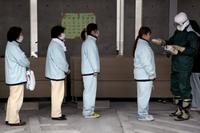-
Universal Detection developing radiation detector for smartphones
Last week Universal Detection Technology announced that it had begun development of a radiation detection device designed to work with smart phones
-
-
Rapiscan to develop advanced nuke detection tech for DHS
DHS’ Domestic Nuclear Detection Office (DNDO) recently awarded Rapiscan Systems a contract worth as much as $7 million to develop advanced new technologies to address the nation’s most pressing challenges in detecting nuclear materials
-
-
New materials hold promise for better detection of nuclear weapons
Researchers have developed new materials that can detect hard radiation, a very difficult thing to do; the method could lead to a hand-held device for detecting nuclear weapons and materials, such as a “nuclear bomb in a suitcase” scenario
-
-
Detecting contraband radioactive material
Researchers are building a highly sensitive instrument that will detect illicit radioactive materials with pinpoint accuracy from a safe distance; such materials, located in shipping ports, train stations, truck stops, or warehouses, potentially could be used to make dirty bombs or associated with a nuclear device itself
-
-
Innovative plastic slashes cost of radiation detectors

Japan’s Teijin Chemicals announced it will begin supplying scintirex, an innovative low-cost radiation-fluorescent plastic, in late September; scintirex will be used in scintillators — the material at the core of radioactive radiation detectors; the use of the new plastic will slash the production cost of scintillators to one tenth or less of current levels
-
-
Radiation detection market to see accelerated growth
The radiation detection industry will see accelerated growth as a result of ongoing homeland security concerns to greater concerns about safety in the nuclear power industry; the growth will involve both increases in the volume of materials required, and in the types of materials being sought
-
-
Cheap radiation detector made of PET resin developed
Researchers develop a revolutionary radiation-sensitive plastic with a performance superior to plastic scintillators used for measuring radiation; the discovery will enable a major reduction in production costs — a step toward an inexpensive radiation detector available to everyone
-
-
Dallas launches regional nuke detectors
The Dallas police will soon be participating in a regional radiological nuclear detection program that will help law enforcement officials detect any anomalies and help protect against any nuclear or radiological attacks
-
-
Underwater nuke detecting drone
Unmanned underwater vehicles (UUV) could soon be prowling the nation’s coastline to detect radiological and nuclear threats; the underwater drones, developed by New Jersey based Princeton Security Technologies, Inc., are equipped with radiological isotope identification hardware to monitor any changes below the water
-
-
DNDO formally approves Smiths Detection’s RadSeeker
Smiths Detection’s newly launched RdSeeker radiation detection has been formally approved by DHS Domestic Nuclear Detection Office (DNDO) for production and deployment
-
-
Troubled $1.2 billion nuclear detection program cancelled
After news hit that DHS was planning on spending additional money to procure a troubled nuclear detection system that has been plagued with problems, the Obama administration decided to scrap the $1.2 billion program
-
-
Crystals developed to detect chemical and nuclear bombs
Researchers are currently exploring the use of crystals to help detect radioactive materials as well as chemical bombs; using a $900,000 grant awarded by the National Nuclear Security Administration Office’s Nonproliferation Research and Development arm, scientists from Fisk University and Wake Forest University are studying the viability of using strontium iodide crystals to screen cargo containers for dangerous explosives
-
-
Troubled radiation screening program gets additional $300 million
The Advanced Spectroscopic Portal (ASP) procurement program has hit another snag in its short-lived, yet troubled life; a recent unreleased Government Accountability Office (GAO) found that DHS plans to spend more than $300 million dollars to purchase several hundred ASPs, radiation detection equipment, that has not been fully tested and may not even work at all
-
-
New radiation detector unveiled, does not rely on helium-3
Princeton Security Technologies, Inc. appears to have a solution to the quickly dwindling helium-3 stockpiles; on Tuesday the company announced that it had developed and delivered the first commercially available nuclear materials detector that does not rely on helium-3
-
-
DHS tests three radiation detection systems at Belmont Stakes race
DHS officials recently announced that it had tested three developmental systems designed to detect radiological weapons at the Belmont Stakes horse race in New York held on Saturday, 11 June; DHS tested two mobile Stand-Off Radiation Detection Systems; the third device tested was a Roadside tracker which scans for radiation sources in vehicles
-
- All
- Regional
- Water
- Biometrics
- Borders/Immig
- Business
- Cybersecurity
- Detection
- Disasters
- Government
- Infrastructure
- International
- Public health
- Public Safety
- Communication interoperabillity
- Emergency services
- Emergency medical services
- Fire
- First response
- IEDs
- Law Enforcement
- Law Enforcement Technology
- Military technology
- Nonlethal weapons
- Nuclear weapons
- Personal protection equipment
- Police
- Notification /alert systems
- Situational awareness
- Weapons systems
- Sci-Tech
- Sector Reports
- Surveillance
- Transportation
Advertising & Marketing: advertise@newswirepubs.com
Editorial: editor@newswirepubs.com
General: info@newswirepubs.com
2010-2011 © News Wire Publications, LLC News Wire Publications, LLC
220 Old Country Road | Suite 200 | Mineola | New York | 11501
Permissions and Policies
Editorial: editor@newswirepubs.com
General: info@newswirepubs.com
2010-2011 © News Wire Publications, LLC News Wire Publications, LLC
220 Old Country Road | Suite 200 | Mineola | New York | 11501
Permissions and Policies
